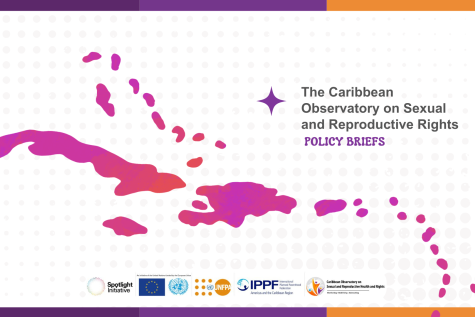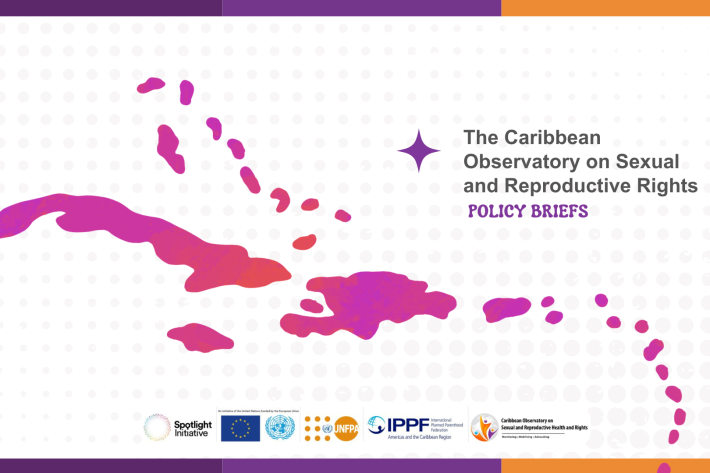Spotlight
A selection of resources from across the Federation

Americas & the Caribbean
Caribbean Observatory on SRHR: Policy Briefs
Data and Advocacy critical to shaping SRHR in the Caribbean
Filter our resources by:


| 06 November 2020
Bringing sex education out of the classroom and into the library in Queens
Planned Parenthood partners with Queens libraries to bring sex education out of the classroom and into the library. The partnership employs the library's traditional role as a source of information creating a safe space for today's teenagers to ask for support. Photography © IPPF/Bill Kotsatos Taking sex education to teens in Queens, NY

| 28 October 2020
Resilience
Mexfam, IPPF member association in Mexico, continued to provide free healthcare during and after the record-breaking earthquakes in September 2017, despite many members of staff losing their homes and even family members. This is what resilience looks like and we thank those that continue to provide people with vital sexual and reproductive healthcare.

| 28 October 2020
Resilience and commitment in the aftermath of Mexico's devastating earthquakes
In September 2017, Mexico suffered from a devastating magnitude 7.1 earthquake that left hundreds dead and injured, while crushing buildings and destroying infrastructure. We immediately activated our humanitarian response network which assessed damage, deployed personnel, and made sure our mobile clinics were able to operate and reach local communities with vital healthcare and services. Mexfam, an IPPF member association in Mexico, continued to provide free healthcare during and after the record-breaking earthquakes, despite many members of staff losing their homes and even family members. This is what resilience looks like and we thank those that continue to provide people with vital sexual and reproductive healthcare. Photography © IPPF/Brenda Islas Photos: © IPPF/Brenda Islas

| 30 September 2020
Sexual Rights: An IPPF declaration
Sexuality is a natural and precious aspect of life, an essential and fundamental part of our humanity. For people to attain the highest standard of health, they must first be empowered to exercise choice in their sexual and reproductive lives; they must feel confident and safe in expressing their own sexual identity. Today, discrimination, stigma, fear and violence pose real threats to many people. These threats and the actions they trigger – ranging from disheartening to life-threatening in nature – prevent many people from attaining basic sexual rights and health. IPPF is committed to fulfilling its goals through an approach that embodies the principles of universality, interrelatedness, interdependence and indivisibility of all human rights. We will do all we can to ensure that sexual rights – human rights – are respected through our own service provision and advocacy, and also in the wider public sphere. Sexual Rights: An IPPF Declaration represents the culmination of more than two years of work that spanned the globe. Its development was guided by a diverse group of individuals: internationally-renowned experts in sexual and reproductive health, human rights, law and public health; senior IPPF volunteers, each of whom brought unique regional perspectives and who together represented a range of experience and strengths; and three senior directors of the IPPF secretariat. The Declaration developed through regional meetings and events that took place across the Federation and built on the IPPF Charter of Sexual and Reproductive Rights. While there has already been some progress toward meeting the Millennium Development Goals and the targets of the 1994 ICPD (International Conference on Population and Development) Programme of Action, there is still much work to be done. Sexual rights are a component of human rights, they are an evolving set of entitlements related to sexuality that contribute to the freedom, equality and dignity of all people, and they cannot be ignored. We must persevere; we must be uncompromising and passionate in our efforts to decrease stigma and improve access to services, and to increase recognition of sexuality as a positive aspect of human life. Marginalized groups such as young people, transgender people, sex workers, men having sex with men, people who are gay, lesbian or bi-sexual, child brides and girl mothers particularly need our compassion. The Declaration applies equally to girls and women who are vulnerable to or have been subjected to gender-based violence, including traditional norms such as female genital mutilation and discrimination based on male preference. Sexual Rights: An IPPF Declaration is an indispensable tool for all organizations, activists, researchers, policy- and decision-makers who are working to promote and ensure human rights. The Declaration will enable members of the sexual and reproductive health and human rights communities to create change and build on the momentum that has already begun around sexual rights in preparation for the next International Conference on Population and Development in 2015. Too often denied and too long neglected, sexual rights deserve our attention and priority. It is time to respect them. It is time to demand them. We trust that the Declaration will serve you well on the journey ahead.

| 30 September 2020
Globally Connected: Being a Young Volunteer in IPPF
Globally Connected: Being a Young Volunteer in IPPF is a guide for young people who are part of the IPPF global ‘family’. It gives an overview of young people’s rights and responsibilities within the Federation, the six regional youth networks, and the different roles available – from peer educator to representing IPPF at international meetings. The guide outlines how IPPF’s new Strategic Framework involves young people and young volunteers from Member Associations across the world give information about their own roles within the Federation.

| 30 September 2020
IPPF GGR Policy Briefing
The Global Gag Rule bans international organizations that receive USAID funding from providing abortions, counselling for abortions, or otherwise acknowledge abortion as a pregnancy option and as part of family planning and sexual and reproductive healthcare. This includes referring a woman or girl to an abortion provider if they want an abortion. IPPF believes in the right of women and girls to decide about their own health and wellbeing, including in right to decide if and when she wants to be pregnant. IPPF Member Associations will not deny life-saving healthcare services to any women, especially to the world’s poorest women who are disproportionately affected by the Global Gag Rule.












